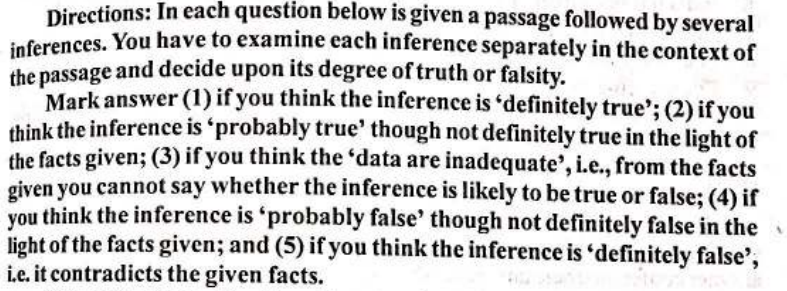
Even after allowing for the inclusion of the unavoidable chillies, on the whole the Indian diet seems to be more protective than carcinogenic. The per capita fat intake is only 14-20 g daily, far below even the per capita consumption of 35 g daily recommended by the Indian Council of Medical Research. In practice, most of the population is essentially vegetarian, as even the so-called non-vegetarians eat meat only once or twice a week, meat being expensive. The incidence of cancer in India, with the age standardised rate of 115 per 100,000, is one of the lowest in Asia, and is only about one-third incidence in the West. The Indian diet may be one of the factors responsible.
Consumption of meat would go up if meat becomes cheaper.
The correct Answer is:1
Similar Questions
Even after allowing for the inclusion of the unavoidable chillies, on the whole the Indian diet seems to be more protective than carcinogenic. The per capita fat intake is only 14-20 g daily, far below even the per capita consumption of 35 g daily recommended by the Indian Council of Medical Research. In practice, most of the population is essentially vegetarian, as even the so-called non-vegetarians eat meat only once or twice a week, meat being expensive. The incidence of cancer in India, with the age standardised rate of 115 per 100,000, is one of the lowest in Asia, and is only about one-third incidence in the West. The Indian diet may be one of the factors responsible.
Chillies make a diet carcinogenic.
View SolutionEven after allowing for the inclusion of the unavoidable chillies, on the whole the Indian diet seems to be more protective than carcinogenic. The per capita fat intake is only 14-20 g daily, far below even the per capita consumption of 35 g daily recommended by the Indian Council of Medical Research. In practice, most of the population is essentially vegetarian, as even the so-called non-vegetarians eat meat only once or twice a week, meat being expensive. The incidence of cancer in India, with the age standardised rate of 115 per 100,000, is one of the lowest in Asia, and is only about one-third incidence in the West. The Indian diet may be one of the factors responsible.
Indians are likely to be more overweight than others.
View Solution
Knowledge Check
Indian Council of Forestry Research and Education is located in
ADehradunBRanchiCNew DelhiDRaipurIndian Council of Forestry Research and Education is located in
ADehradumBRanchiCNew DelhiDRaipurThe only vegetarian sea mammals are
AWalrusesBSealsCWhalesDManatees
Even after allowing for the inclusion of the unavoidable chillies, on the whole the Indian diet seems to be more protective than carcinogenic. The per capita fat intake is only 14-20 g daily, far below even the per capita consumption of 35 g daily recommended by the Indian Council of Medical Research. In practice, most of the population is essentially vegetarian, as even the so-called non-vegetarians eat meat only once or twice a week, meat being expensive. The incidence of cancer in India, with the age standardised rate of 115 per 100,000, is one of the lowest in Asia, and is only about one-third incidence in the West. The Indian diet may be one of the factors responsible.
Indian diet is the main reason behind the low incidence of cancer.
View Solution
Even after allowing for the inclusion of the unavoidable chillies, on the whole the Indian diet seems to be more protective than carcinogenic. The per capita fat intake is only 14-20 g daily, far below even the per capita consumption of 35 g daily recommended by the Indian Council of Medical Research. In practice, most of the population is essentially vegetarian, as even the so-called non-vegetarians eat meat only once or twice a week, meat being expensive. The incidence of cancer in India, with the age standardised rate of 115 per 100,000, is one of the lowest in Asia, and is only about one-third incidence in the West. The Indian diet may be one of the factors responsible.
The percentage of people suffering from cancer is the lowest in the case of India.
View SolutionThe only vegetarian sea mammals are
View SolutionWhat is per capita income?
View SolutionWhat is per capita income?
View Solution
